A relationship with a partner who struggles with a personality disorder is far from easy. Imagine being married to a narcissist, and going through life either pandering to their exaggerated sense of self-importance or dealing with the consequences of making them feel slighted, sidelines, eclipsed. It can be terribly hard to accept that you’re inconsequential in the most intimate relationship of your life even when you know what you’re dealing with. The struggle is compounded manifold when you’re dealing with a covert narcissist husband.
Unlike their overt (or extroverted) counterparts, whose sense of grandiose and self-absorption is a lot more on the nose and thus easier to spot, a covert narcissist is shier and stealthier in their approach. They learn behaviors to carefully mask their narcissistic traits, which makes it harder for a partner to spot the red flags until it is too late. If you’re beginning to suspect that your husband’s attitude and personality traits align with narcissist behavior and are beginning to connect the dots to how this has shaped your relationship and impacted your mental health, you may feel trapped and hopeless, especially if walking away is not an option.
While the situation is undoubtedly challenging, you can find a way to navigate it without letting your sense of self take an irreparable hit. We’re here to help you figure out how to deal with a narcissist husband in consultation with psychotherapist Ashna Lahoty (Masters in Clinical Psychology), who specializes in offering counseling services for a wide range of mental health disorders.
Who Is A Covert Narcissist?
Table of Contents
Ashna says to be able to understand how a covert narcissist functions, one needs an understanding of narcissistic personality disorder. In the American Psychiatric Association dictionary, narcissism is defined as excessive self-love or egocentrism.
This definition offers insight into what narcissistic personality disorder entails. It is a mental health condition that results in an inflated sense of self and leaves the affected person with a disproportionately high view of their importance. A complete lack of empath is also a defining trait of narcissistic personality disorder. Together these traits make a narcissistic person incapable of caring about or even understanding other people’s feelings.
Ashna explains, “Narcissist is a term usually used to describe people that show these narcissistic traits. They may come across as self-centered, manipulative, and as if they don’t care about anyone else but themselves. They can be of two types: overt and covert narcissists. While both types share many similarities, including a lack of empathy, an inflated sense of self-importance, and a need for admiration, the way that each type presents outwardly can differ.
“The key difference is that covert narcissists are subtle in their display of narcissistic traits and tendencies. They may come across as self-absorbed, and insecure. They are sensitive to criticism and may show their displeasure through passive-aggressive means. People with covert narcissism also rely on others to build up their self-esteem. They have a tendency to hold onto grudges and it comes out in subtle vengeful ways.”
Related Reading: Exposing A Narcissist – What You Should Know
Covert vs overt narcissism
It can be hard to associate narcissism with subtle and stealth behaviors, given the me-first lens through which people affected by this personality disorder view the world. To be able to understand the distinction between the two, it’s important to understand that in the field of psychology, overt and covert are terms used to categorize behaviors that are easy to recognize and those that are more understated.
Since narcissistic personality disorder operates on a spectrum, its manifestation can vary depending on factors such as personality and temperament. For sake of greater clarity, let’s take a closer look at the differences between covert and overt narcissists:
| Covert narcissists | Overt narcissists |
| They are shy and lack the confidence for an exhibitionist style of grandiose | They are exhibitionists and demand attention |
| They struggle with feelings of shame and self-doubt, which gets in the way of their desire for power and glory. This is also what makes them overly sensitive to criticism | Their narcissism revolves around a sense of grandiose and they go through life expecting extraordinary success |
| They are jealous of other people’s achievements. This coupled with their low self-esteem can make them extremely untrusting of others | Overt narcissistic relationships are shallow because they view themselves to be better than others |
| A covert narcissist may struggle with a lack of sense of purpose because they’re easily bored | They are very decisive and have unshakable conviction in their opinions and ideas |
| They can be pathological, compulsive liars | They come across as charming, bold, and friendly at first |
If you can identify with these covert narcissist traits and feel that you’ve dealt with them in your husband, there is a good chance that your suspicions are on point. To be sure, let’s explore some signs of covert narcissistic behavior.
Related Reading: 10 Things To Do When Your Relationship Feels Off
7 Signs You Have A Cover Narcissist Husband
Relationships with narcissists are a struggle, as you’re constantly subjected to a vicious cycle of love-bombing, romantic manipulation, gaslighting, and narcissistic hoovering. Emotional abuse, in some form, is inevitable in narcissistic relationships and it takes a toll on the victim’s mental health.
If you’re dealing with a covert narcissist husband, identifying the warning signs of this personality disorder early on can be difficult because the tell-tale markers such as elevated sense of self, arrogance, and a need for attention and admiration may be absent or not as pronounced as it is in an overt narcissist. This does not mean that a covert narcissist doesn’t crave these things, but they may seek them in different ways. To be able to understand how to deal with a narcissist husband with covert tendencies, you need to be able to recognize what their behavior patterns amount to. Ashna shares some covert narcissist traits and signs to watch out for:
1. Your husband is passive-aggressive
“Passive aggression is one the defining attributes of covert narcissism. Your partner may claim that he is “fine” or there’s “nothing wrong” when you can see that he is visibly upset and far from okay. He may then go on to use the silent treatment to convey his anger or resort to sarcasm or subtle digs and backhanded compliments to make his displeasure known to you,” says Ashna.
These passive-aggressive tendencies are a key element of narcissistic abuse aimed at annihilating the victim’s self-worth and confidence in themselves. “My narcissist husband blames me for everything. Why can’t I do anything right?” Such sentiments of self-doubt can begin to weigh on your mind when dealing with a covert narcissist husband.
2. He is extremely jealous
Ashna says, “Covert narcissists have a tendency to be jealous of everything. Since their own self-doubt and lack of confidence impedes their ability to achieve what they think they’re capable of, they can become bitter and resentful of others’ achievements, including that of their spouses.”
This jealousy often manifests in the things covert narcissists say in response to other people’s achievements:
- “Why are you making such a big deal about something so insignificant?”
- “I recently did XYZ, which was far more challenging”
- “You got lucky”
- “Oh, you got promoted. Do you think you can handle the responsibilities that come with your new role”
If such invalidating statements are a constant feature in your marriage, it is one of the signs you’re dealing with a covert narcissist husband.

Related Reading: 11 Signs You Are Dealing With An Unhealthily Jealous Partner
3. He thrives on creating confusion
A covert narcissist makes for a gaslighting husband. When he is not blaming and shaming you in a passive-aggressive way or putting you down because he is jealous of you, he will thrive on leaving you feeling confused.
He may resort to some classic gaslighting phrases to distort your perception of reality and leave you second-guessing yourself. Here is what these phrases may sound like:
- “That’s not what I said”
- “I’m saying this because you don’t know what’s right for you”
- “You’re overreacting”
- “I’m saying/doing this because I love you”
- “You’re oversensitive”
- “You’re acting irrationally because you’re jealous/insecure”
And why does he do that? Because it offers him leverage and allows him to remain in control of the narrative and steer the relationship in a direction that suits him. Narcissistic abuse and manipulation are means of skewing the power dynamics in the relationship in his favor. And gaslighting his most potent weapon in achieving that goal.
4. Your husband is highly sensitive to criticism
If you’re married to a covert narcissist, making them see the error of their ways without inviting backlash or blame-shifting is out of the question because they’re incapable of taking responsibility. “You may notice that your husband is extremely sensitive to criticism. One of the reasons behind it is that a covert narcissist believes they are better than everyone else around,” explains Ashna.
Narcissist behavior in response to criticism is typically highly emotional and volatile. Even a minor comment is enough to make them sad and despondent because even though they have an exaggerated sense of their own importance, they are also extremely dependent on validation and admiration from their “loved ones”.
5. Your sex life is centered on your husband’s pleasure
Covert narcissists not only lack empathy but can also be extremely self-absorbed in their approach to physical intimacy. While at the love-bombing stage of the relationship, your covert narcissist husband may have been extremely generous and giving in bed, you will notice that attitude shift once they’ve won you over.
He will exhibit an insatiable need for admiration and expect sex to be centered on his pleasure while he acts disengaged and detached the whole time. When this tendency begins to put you off, he will resent you for not doing enough to please him sexually. As a result, yours can turn into a sexless marriage over time.
If and when that happens, he will be quick to suggest that you seek help for your inability to be intimate with him without taking responsibility for his role in the problem.
6. He doesn’t understand boundaries
Boundaries are bad news for your covert narcissist spouse because they impede his ability to manipulate and control you. Besides, the covert narcissism driving his behavior makes him feel he is entitled to get what he wants and when he wants it. Boundaries also get in the way of that.
“One of the most telling signs of a covert narcissist is that they don’t understand the concept of personal boundaries and lack them. If your husband acts like the victim and claims to be isolated, and alone, and behaves as if you’ve rejected his existence in your life the moment you ask for some space and distance, you’re dealing with a covert narcissist,” says Ashna.
This is precisely why relationships with narcissists begin with the love-bombing stage where too much happens too quickly even before you can make sense of what is what. This can lead to an enmeshed relationship. While being one with your partner may sound like a romantic notion, when you’re the only one losing your identity and sense of individuality, it’s a recipe for toxicity.
7. He is a textbook attention-seeker
ME! ME! ME! Look at me, listen to me, admire me, talk about me, cater to my needs…Even if a covert narcissist isn’t as forthcoming about their need for attention and admiration, they do desire it with every fiber of their being. “This often translates into highly attention-seeking behavior,” says Ashna.
Here is what a covert narcissist’s attention-seeking behavior may look like:
- Monopolizing conversations
- Minimizing their own accomplishments so that others can praise them
- Nonchalantly slip something they may have done or achieved into conversations to get compliments and praise
- Paying attention to others only when it feeds their need for self-importance
5 Ways To Cope In A Marriage With A Covert Narcissist
Now that you identify the signs of a covert narcissist husband, it may have put into perspective a lot of the troublesome patterns in your relationship. For example, the thought “my narcissist husband blames me for everything” may not leave you as unsettled as before because you understand exactly where it’s stemming from. Or you may recognize that your gaslighting husband is saying exactly the kind of things covert narcissists say to remain in control and manipulate their partners.
Now, the question is: what do you do with this knowledge? Undeniably, it is impossible to build a wholesome, fulfilling relationship with a narcissistic partner – overt or covert – and walking away can be the best decision for self-preservation. But what if, for some reason, walking away is not an option? You need the right coping skills to deal with your spouse’s narcissist behavior.
To help you channel the insights you’ve just gathered into effective coping skills, we bring you these 5 expert-back tips on how to deal with a narcissist husband with covert tendencies:
Related Reading: How To Make A Narcissist Miserable – 13 Things To Do
1. Set clear boundaries
As we mentioned, covert narcissists struggle with the concept of boundaries. But for the sake of your mental health and to be able to stand up against their abusive tendencies, it’s absolutely crucial that you focus on establishing clear, unambiguous boundaries in the relationship.
“Begin by setting healthy boundaries, be it in communication or needs,” advises Ashna, adding, “But also be prepared for pushback because your covert narcissist husband is not going to like it when you draw a line in the sand. It can be extremely threatening for him, and he may respond by lashing out or playing the victim.”
Do not succumb to these pressures and stand your ground. Here are a few examples of what healthy boundaries in a relationship with a covert narcissist may look like:
- Not letting him talk to you as he pleases
- Not letting him get away with treating you with disrespect
- Asking for your thoughts and opinions to be heard
- Saying no and insisting that he accept that response
- Asking for space when you need it
2. Set realistic expectations

“Setting realistic expectations can help you navigate this relationship with as little emotional damage as possible,” says Ashna. This means accepting that a person with a narcissistic personality disorder is incapable of offering the love, affection, and care necessary for building a wholesome relationship.
This acceptance will serve as a reminder that this will never be what a typical intimate partnership is supposed to feel like. When you limit your expectations from your spouse, coexisting with him can become somewhat easier.
Related Reading: Expectations In Relationships: The Right Way To Manage Them
3. Build a support system
Narcissists thrive on isolating their victims from their inner circle of people because it aligns with their need to exert control over their partners and manipulate them. As a result, you may be left feeling lonely and detached from the people who genuinely love and care about you.
Now that you see your covert narcissist husband for who he is, it’s time to change this. “Build a healthy support system that can help you see situations clearly when you are in doubt and unsure if you are being manipulated because that’s how subtle they can be,” says Ashna.
So, reach out to your family members and close friends, and confide in them. Share what you’ve been going through and lean on them for support. Dealing with your spouse and the troubles of your marriage can become a lot easier if you have the support of your loved ones to see you through.
4. Call him out
Ashna advises, “When you see your spouse displaying traits of covert narcissism, point it out and bring their attention to it. They may deny it, but at least you’ll know that you did what you could.”
However, make sure you take this step only when you’re sure that it won’t put you in harm’s way. If you suspect that your partner is capable of escalating their abusive ways to violence, it is best to quietly distance and detach yourself from him (even if you continue to be in the marriage and live in the same house).

Related Reading: Emotional Abuse — 9 Signs And 5 Coping Tips
5. Seek professional help
Trying to build a life and make a marriage work with a covert narcissist husband is like running up a hill with boulders coming down at you. You’re bound to end up battered and wounded. Victims of narcissistic abuse often grapple with a host of mental health issues, ranging from anxiety to post-traumatic stress disorder (PTSD) and severe depression.
It’s vital to prioritize self-care and get the help you need to process the emotional wounds of being in this relationship. If you’re exploring the idea of seeking professional help, know that skilled and experienced counselors on Bonobology’s panel are here for you.
Key Pointers
- Covert narcissism is a subtle manifestation of NPD, where the affected person isn’t as upfront and vocal about their exaggerated and strong sense of self and need for admiration
- It can be harder to spot a covert narcissist because the red flags and warning signs may not be visible until you’re already too invested in the relationship
- Passive aggression, jealousy, lack of a sense of boundaries, and attention-seeking behavior are some of the signs of a covert narcissist
- If you’re married to a covert narcissist, you can cope by setting boundaries and realistic expectations, building a support system, detaching yourself emotionally, and seeking professional help to heal from the damage already done
Sharing your life with a covert narcissist husband can be your worst nightmare come true. No one deserves to be treated the way narcissists treat the people in their life. You too deserve better. But if for some reason freeing yourself from this relationship is not an option, your best bet is to make the best of a bad situation. We certainly hope that the tips and insights we offered you will help you do that.
7 Reasons Why Narcissists Can’t Maintain Intimate Relationships
Your contribution does not constitute a charitable donation. It will allow Bonobology to continue bringing you new and up-to-date information in our pursuit of helping anyone in the world to learn how to do anything.




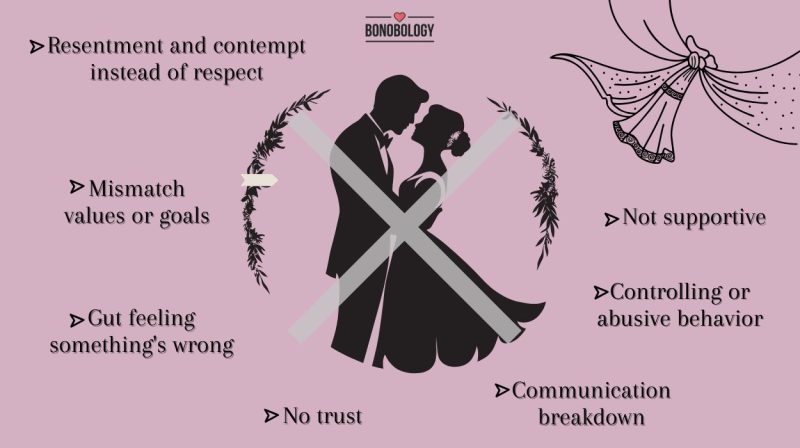

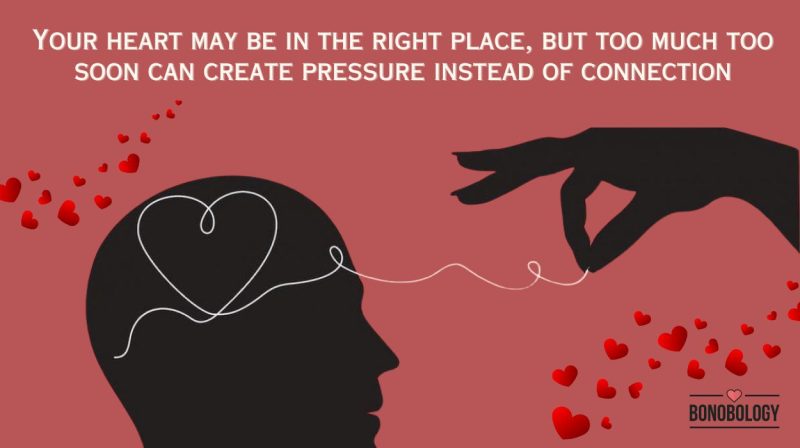






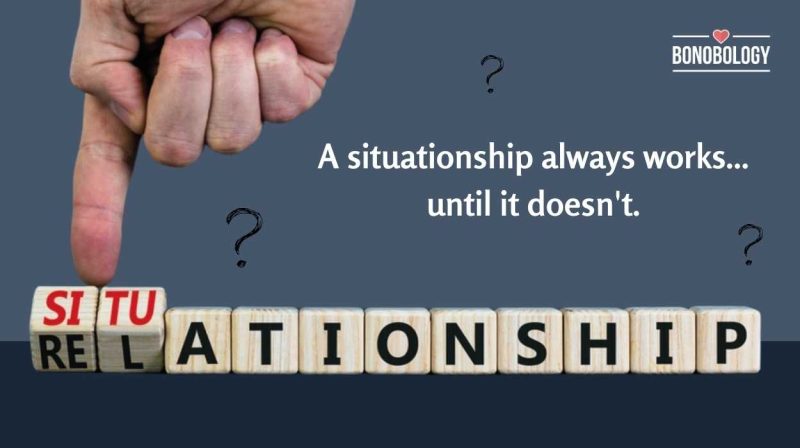

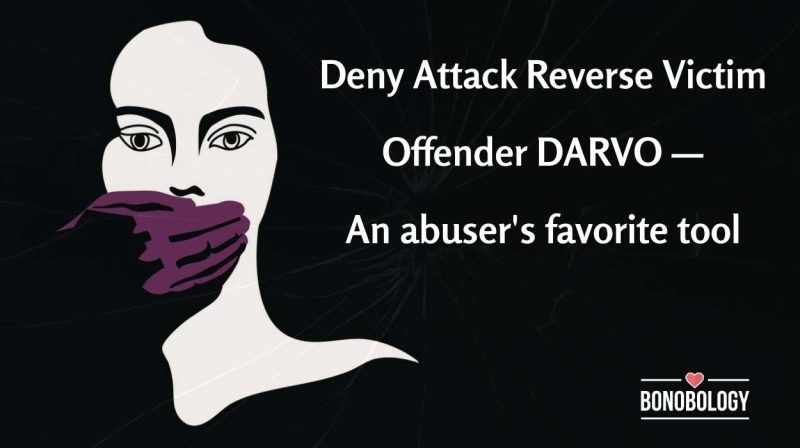

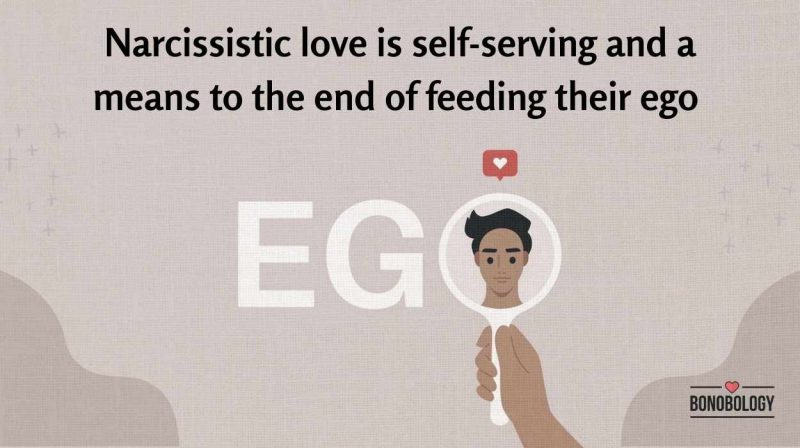
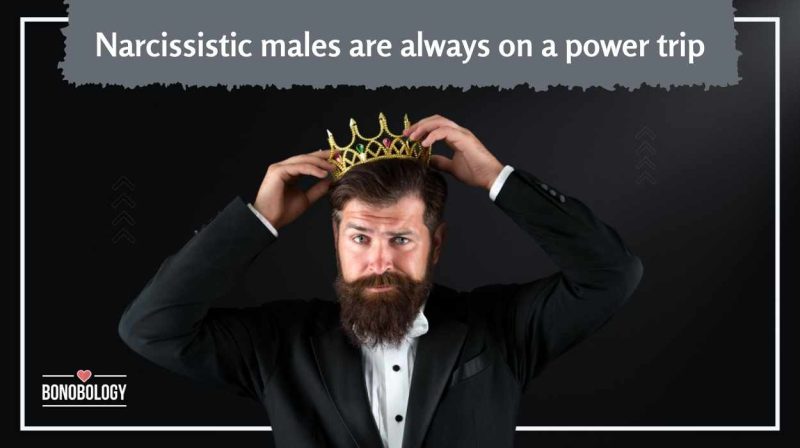

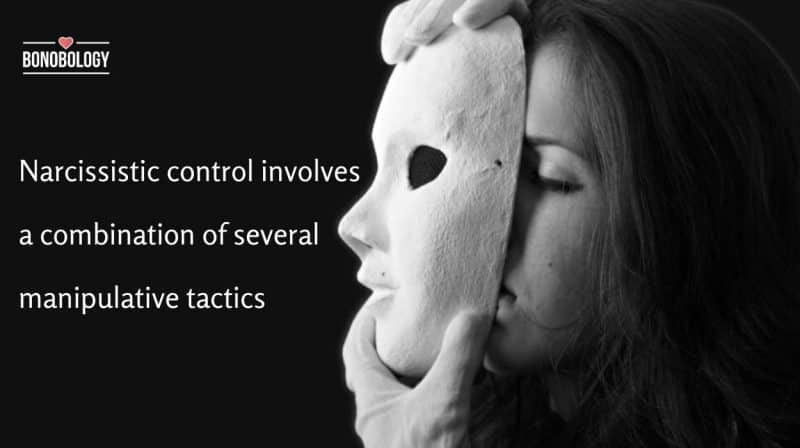

Featured
17 Red Flags In A Relationship To Be Wary Of
What Is A Trophy Wife?
7 Signs You Should Not Marry Him
Signs A Guy Is Obsessed With You In A Bad Way: 15 Red Flags
Unintentional Love Bombing: 9 Ways You May Be Overwhelming Your Partner
13 Signs Of A Hot And Cold Relationship & How To Break The Pattern
21 Subtle Signs You’re Not Really In Love With Your Partner
I Hate My Girlfriend: Why You Feel This Way And What To Do
When Health Challenges Affect Your Relationship Dynamics
5 Harsh But True Signs He’ll Never Marry You
21 Signs That You Are Alone In A Relationship
11 Situationship Red Flags You Should Know About
Why Do I Get Attached So Easily? 9 Possible Reasons and Ways to Stop
How To Respond To DARVO: Expert Lists 7 Strategies
What Is Fexting, And Why Is It Bad For Your Relationship?
Are Narcissists Capable Of Love?
11 Prominent Male Narcissist Traits to Watch For
Why Does My Girlfriend Hit Me? Expert Shares 11 Possible Reasons And Ways To Cope
How Does A Narcissist React When They Can’t Control You?
“My Anxiety Is Ruining My Relationship”: 6 Ways It Does And 5 Ways To Manage It